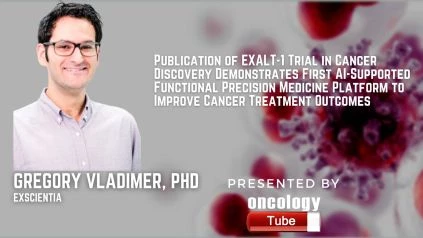Gregory Vladimer, Ph.D., VP of translational research at Exscientia and co-inventor of the AI-precision medicine platform speaks about Publication of EXALT-1 Trial in Cancer Discovery Demonstrates First AI-Supported Functional Precision Medicine Platform to Improve Cancer Treatment Outcomes.
Final results from the EXALT-1 study were published today in Cancer Discovery, a journal of the American Association of Cancer Research, by Exscientia (Nasdaq: EXAI), the Medical University of Vienna, and the CeMM Research Center for Molecular Medicine of the Austrian Academy of Sciences. The study, titled “Functional Precision Medicine Provides Clinical Benefit in Advanced Aggressive Haematological Cancers and Identifies Exceptional Responders,” shows the potential real-world impact of using Exscientia’s AI-supported precision medicine platform (referred to in the study as single-cell functional precision medicine or scFPM) to recommend which therapy would be most effective for late-stage haematological cancer patients based on drug responses testing. The study’s preliminary findings were originally published in The Lancet Haematology.
The EXALT-1 study was a basket trial for patients with a variety of aggressive haematological malignancies. It was a prospective, single-arm, open-label study. A total of 76 patients were assessed in the study. Sixty-six patients were treated according to the scFPM, and twenty patients were treated according to the physician’s discretion. At a median follow-up of 23.9 months, 54 percent of patients (30/56) had a clinical benefit of more than 1.3-fold improved progression-free survival (PFS) compared to their previous therapy, with 40 percent of responders (12/30) having exceptional responses lasting at least three times longer than expected for their disease. PFS was considerably improved with scFPM-guided therapy (p=0.0093). Notably, after 12 months of scFPM-guided therapy, 23% of patients (13/56) were progression-free, compared to only 5% of patients (3/56) on their previous treatment. The objective response rate for patients treated based on scFPM data was 55%.
Exscientia’s precision medicine platform use artificial intelligence (AI) to do single-cell, high-content analysis of individual patient tissue samples, resulting in clinically meaningful insights about which treatments will benefit each patient the best. While collaborating in Giulio Superti-group Furga’s at the CeMM Research Center for Molecular Medicine in Austria, Dr. Gregory Vladimer and Prof. Berend Snijder, currently at the ETH Zurich, created the underlying technology.

